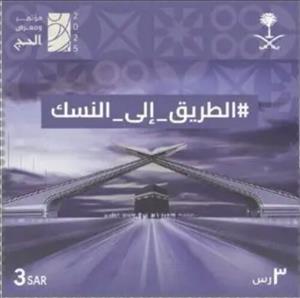Stamp: 2025 Hajj Conference and Exhibition, Jedda (Saudi Arabia 2025)
2025 Hajj Conference and Exhibition, Jedda (Saudi Arabia 2025)
14 January (Saudi Arabia ) within release 2025 Hajj Conference and Exhibition, Jedda goes into circulation Stamp 2025 Hajj Conference and Exhibition, Jedda face value 3 Saudi riyal
| Stamp 2025 Hajj Conference and Exhibition, Jedda in catalogues | |
|---|---|
| Colnect codes: | Col: SA 2025.01.14-01 |
Stamp is square format.
Also in the issue 2025 Hajj Conference and Exhibition, Jedda:
- Stamp - 2025 Hajj Conference and Exhibition, Jedda face value 3;
- Full Pane - 2025 Hajj Conference and Exhibition, Jedda face value 4*3;
Stamp 2025 Hajj Conference and Exhibition, Jedda it reflects the thematic directions:
A conference is a meeting, often lasting a few days, which is organized on a particular subject, or to bring together people who have a common interest. Conferences can be used as a form of group decision-making, although discussion, not always decisions, is the primary purpose of conferences. The term derives from the word confer.
Muslims (Arabic: المسلمون, romanized: al-Muslimūn, lit. 'submitters [to God]') are people who adhere to Islam, a monotheistic religion belonging to the Abrahamic tradition. They consider the Quran, the foundational religious text of Islam, to be the verbatim word of the God of Abraham (or Allah) as it was revealed to Muhammad, the main Islamic prophet. Alongside the Quran, Muslims also believe in previous revelations, such as the Tawrat (Torah), the Zabur (Psalms), and the Injeel (Gospel). These earlier revelations are associated with Judaism and Christianity, which are regarded by Muslims as earlier versions of Islam. The majority of Muslims also follow the teachings and practices attributed to Muhammad (sunnah) as recorded in traditional accounts (hadith).
Religion is any cultural system of designated behaviors and practices, world views, texts, sanctified places, ethics, or organizations, that relate humanity to the supernatural or transcendental. Religions relate humanity to what anthropologist Clifford Geertz has referred to as a cosmic "order of existence". Different religions may or may not contain various elements ranging from the "divine", "sacred things", "faith", a "supernatural being or supernatural beings" or "some sort of ultimacy and transcendence that will provide norms and power for the rest of life". Religious practices may include rituals, sermons, commemoration or veneration (of deities), sacrifices, festivals, feasts, trances, initiations, funerary services, matrimonial services, meditation, prayer, music, art, dance, public service, or other aspects of human culture. Religions have sacred histories and narratives, which may be preserved in sacred scriptures, and symbols and holy places, that aim mostly to give a meaning to life. Religions may contain symbolic stories, which are sometimes said by followers to be true, that have the side purpose of explaining the origin of life, the Universe and other things. Traditionally, faith, in addition to reason, has been considered a source of religious beliefs. There are an estimated 10,000 distinct religions worldwide. About 84% of the world's population is affiliated with one of the five largest religions, namely Christianity, Islam, Hinduism, Buddhism or forms of folk religion.



